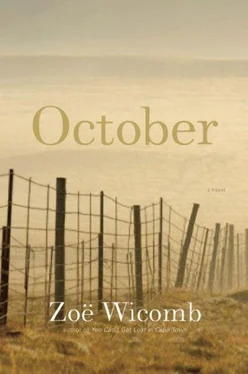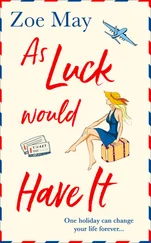See, they said, that was why the child had the beautiful name Sylvie, which meant Good Girl. She had always tried to be the Good Girl that AntieMa said she was — deep down. Except for the time when Sylvie took a sixpence that turned out to have been deliberately left under a chair by Nana as a test. Then AntieMa pursed her mouth and shook her head sadly. What could anyone expect of a child shot through with sin? she asked.
The Willemse sisters were respectable, and not bad looking either, but too full of themselves, people said, almost as snooty as the Murrays, whose house had a verandah and glazed windows. Which the light-skinned Willemses did not have, and neither did they have such good hair, such good blood, so why they gave themselves airs and graces, no one knew.
Ai Goetsega! the old people had sniggered, next thing they’ll be taking on the English talk like the Murrays. Just as well they didn’t have the book learning. Ouma Willemse, with her sour-fig face perched on a regal neck, would have nothing less than a teacher court her girls, and ones with hair to boot, so that the local young men gave up. Pride will come to a fall, they said vengefully, as one by one the men had been turned down, and now, look, a clutch of crooked spinsters with only the small child, whom no one could account for.
Where had the lovely child come from?
The Goodlord has given her to us, they said, and who could argue against such a gift? Which also meant that Sylvie could not leave home, would never be allowed to live in town. Her mothers had pledged to God that she would keep out of Sodom and Gomorrah.
When finally Ousie was of an age and had had enough of trying, she did the decent thing and came home to Namaqualand. Groote Schuur no longer was the glorious place it had been in Dr. Christiaan Barnard’s day. (Ousie thought it only correct to call him by his full name and title.) The trained nurses were lazy, leaving more and more work to experienced aides, and there were too many cheeky African girls who would not take orders. Ousie was of the old-fashioned kind who expected Xhosa girls to look up to her. No, at forty-eight she was a Big Woman, and she had had enough. She would rather go home, tend to chickens, sell eggs, and possibly find work as a housekeeper in the dorp. This time Ousie’s gifts were worthy of one retiring from city life. But that was it, she sighed, final gifts. She was tired; she had had enough of trying.
For Sylvie, there was a camera, and Sylvie did not tire of taking pictures of herself. AntieMa did not approve. Especially later when the girl started dressing up. It was profane, vain, and as the preacher said, vanity must come to a fall. Did the girl have no shame? All those tight, tight clothes that would give any healthy person the hiccups, the skirts too short and the necklines too low, enough to make her mothers choke with shame, but where was hers? Where was Sylvie’s shame? And how could her sewing skills be put to such shameful use?
What do the Old Ones know? They are of another world. They have not noticed how the world around them has changed. Even Ousie for all her city ways is old, wears her colored cringe like a shawl tightly held around hunched shoulders, knows nothing of the world. They think of the new as tarred roads, water from a tap, telephone wires. They do not see that the young are new, that their bodies are fresh, that music beats in their blood, that with their heads lifted to the blue sky, their spirits soar way, way above the little church steeple. Hitse! This is the New South Africa. Even here, in what they call the godforsaken Namaqualand. But the young do not mind that God has forsaken the land. If that is how he wants to play it, so be it.
Here before her silver screen, Sylvie can be anyone at all, but today she is the Reckless One, the Daredevil Goosie who smokes and drinks and who is. . yes, she’ll say it: envied by all. The Good Girl, who has slipped in a teenie-weenie word to become the Good Time Girl. She has borrowed Tiena’s cream canvas jeans and tucked her cigarettes into the right pocket. Just so, on the hip, which she thrusts forward, so that the packet of Marlboros (she always transfers her ciggies into a Marlboro packet) shows. Smoking Can Kill, it says. And you better believe it!
Hitse, all it takes is a skip, a leap or two into a pose — forward, backward, onward Christian soldiers — to be someone else. What does she care? Sylvie does not need a mirror for messing around with her mouth, pouting, or pulling it to the side, tilting her head like the girl with the glossy hair in the Clairol picture. She can stretch out her arm, point a finger, skim it across, taking in you and you and you, all of you stuck-up ones, who will say not a word against her, who wouldn’t dare, ’cause why, she is the Reckless One who’s seen it all, who doesn’t care. Who has Three Mothers. Pity the camera can’t record that movement of the arm swiveling across the imaginary crowd. Pity all has to be rehearsed, for there’s the business of setting things right, then running to take up a practiced pose, breathless and just having to hope for the best, hope that the just-arrivedness does not break through the glossy print.
Sylvie has shooed them all out of the way, but Jakkie and Kytou can be heard messing about behind the house, so that it takes some concentration getting the haughty look. How does one stop oneself from laughing out loud? Perhaps it is too much of a sneer, but it will do, it will do for a Kool Kat. Then Oom Hansie starts up. Stationed at the gate of the klein-kraal, in the dappled shade of the thorn tree, he has begun his usual business of hammering, sawing, nailing down. Just as she thought that he had finished. There is a large bird circling, right above her head for God’s sake. Is it a bird of prey? a hawk? a buzzard of some kind? Come, she shouts, waving a fist, come and get me if you can.
Some will say, what about the flowers, the two pools of purple on either side of her. Well, what about it? A picture needs something pretty, some color. What is there to say except that every year, true as the clock strikes twelve at midday, these patches of dreary old vaalbos, so dead you can kick at it with shod feet and same difference, these two bushes go berserk, and explode, ag, like so many stars into this wild purple, pools of pure flower, with not so much as a tip of gray leaf showing. All around is gray, gray, gray dust, that is, not counting the common gousblom, a bleached yellow, so insipid that as a teenager Sylvie used to pop them into her mouth and swallow them whole whilst Jakkie and Kytou, still laaities themselves, looked on in awe. But here, where she has planted the vygie, its crazed October color bleats like a goat whose lamb is being slaughtered. Which she has always known is for her, Sylvie, and her alone. That is why she turned the patch into a garden, arranged the stones, which Jakkie helped her carry, into an enclosure. In the veld she dug up kanniedood and koekemakranka, and planted them around to show up the glorious purple. That’s not a garden, Jakkie sneered, but what does he know? Jakkie’s job is to do as she says.
If, as AntieMa sighs, the devil has blown into her blood, then that blood is the screaming purple of vygies here at her feet. More Namaqua Daisy than the bottle of sweet wine she could swig in one breath, in a single gurgle. Who amongst the meide could do that? Who could claim that pool of bold purple faces turned to the sun, daring it to scorch?
Sylvie stretches her arm, and with pointed index finger swivels it round once more. Not you, not you, not you. No one, ’cause none has dared to be Sylvie the good-time-girl, dared to plunge into purple. What does she care about the blood of a boer from long, long ago, the respectable blood that AntieMa bleats on about? That is a stale story of aged, tired blood that has clotted in varicose knots on the legs of old women.
Читать дальше












